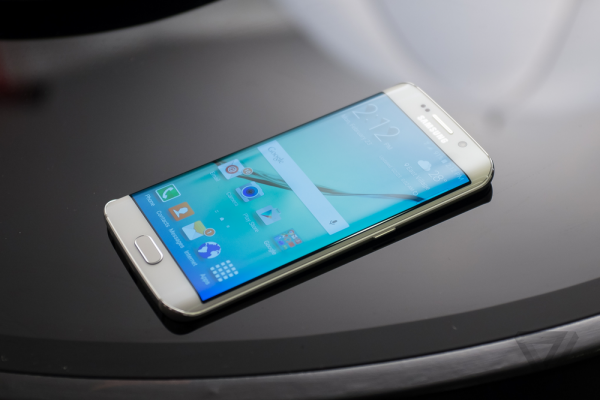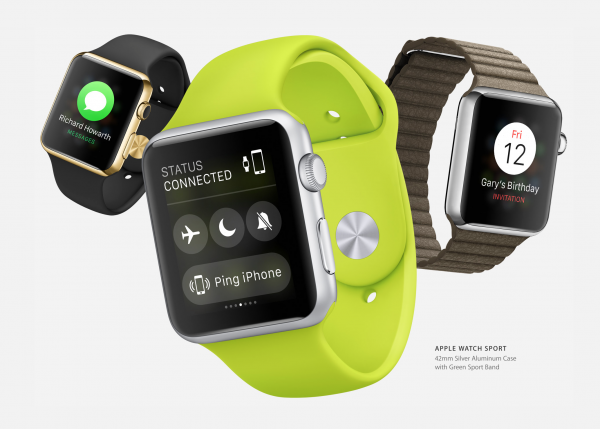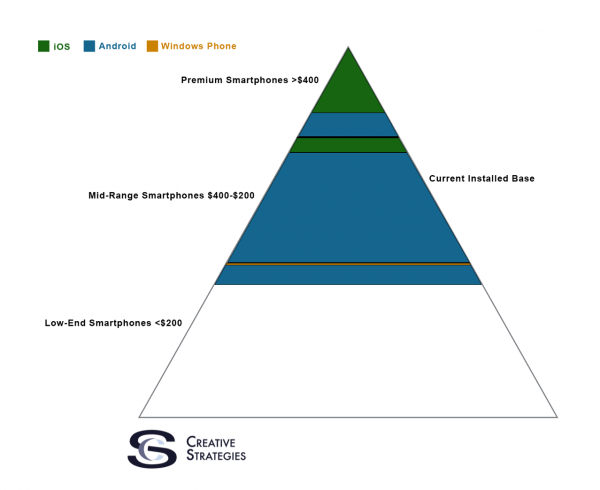Samsung was more focused on mentioning key words such as design, hardware, camera, and mobile payments, instead of discussing why certain things were being done or removed from the phone. This lack of clarity has been Samsung's problem for years as the company has mostly relied on offering consumers choices that other smartphone makers decided not to pursue. The problem is Apple is now selling larger screen iPhones, and Xiaomi and other local Chinese smartphone vendors are selling decent hardware at lower prices. Samsung's differentiation has disappeared. Samsung may not be at the point of utter desperation, but they certainly came off as remaining quite nervous. Samsung says they want to be first in mobile, but they show great discomfort in leading.

Quick Thoughts on the Samsung Galaxy S6 Unveiling
Observations
- It took 18 minutes before they said anything of substance at the announcement. The first 18 minutes was entirely fluffed with ambiguous marketing words like, "leading," "best," "innovative." Those are words that you should never say to describe yourself. Those are words should be exemplified in your work. It's like a guy trying to pick up a girl by saying, "I'm confident and attractive!"
- Hilarious: Samsung makes big deal of Galaxy S6 "Edge" curved screen. AND THEN NEVER SAYS WHY THAT'S BETTER. (via @amir)
- Samsung owners the last 5 years: “iPhone sucks! No removable battery or SD card and plastic is so much more durable!” The S6 —> “Um, oops”. (via @HilzFuld)
- Their camera comparison vs. an iPhone 6 Plus was a joke. — RT @BenBajarin: Samsung clearly doesn’t know how to tap on the iPhone screen on the subjects to change the lighting.
- Samsung's new mantra: “Design with purpose." It took them this long to realize that??
- The bottom of the Galaxy S6 sure looks like an iPhone 6.
The Good
- Screen looks great, as expected by the company that makes the best screens in the industry.
- The shiny colored back screens look really, really great.
- Fast charging is AWESOME. Charging for 10 minutes to get 4 hours of battery life is a game changer.
- Selfie camera looks great and is something that Samsung should keep pushing. Because, let's face it, everyone loves a good selfie. The selfie camera is a very humanized technology.
- The upgraded Gorilla Glass is an evolutionary improvement; eventually all smartphones will have it.
- The overall hardware build quality looks FANTASTIC. No more metallic-painted plastic. For the first time, it looks like Samsung has a premium device that will actually feel like a premium device in your hand.
The Bad
- Looks like they removed the water-resistance from Galaxy line this year. That's a shame. That was a really great feature that really should become the standard.
Questions
- Does the curved screen make any significant improvements to the viewing experience? Do videos really look any better?
- How long will the battery last in the real world? Samsung has been known for cheating benchmarks before.
- How well will the battery hold charges over time? Does fast charging mean the battery will degrade faster than normal?
- The fingerprint scanner has been redone to work more like the iPhone's because the old swipe version was shit. Will this new fingerprint scanner be as technically reliable as Touch ID?
- Does fast charging work over wireless charging? Or is it an asterisk where the fast charging will only work when you plug it in?
- How successful will Samsung Pay be in the U.S.? Outside the U.S? They highlighted how only 10% of retailers support Apple Pay right now, but that number will significantly improve; the U.S. is in the middle of upgrading all merchants to the more secure, encryption chip-based point-of-sale system.
- Does Samsung get a cut or kickback of each Samsung Pay transaction?
- How well will this resonate with existing Samsung buyers? Is there a lot of pent up demand for a new Galaxy S by customers who were unimpressed with the past two models? Will this reverse the downward trend of Samsung's mobile profits?
- If someone was on Samsung for the big screen, and went Apple when it matched that, will they move back again because Samsung dumped plastic? (via@BenedictEvans)
Communication by Touch →
This. Exactly this. But built into the Apple Watch.
When Apple first announced communication as one of Apple Watch's three tent pole features, it sounded gimmicky to me. But the more I thought about it, the more I saw beauty in how well it humanizes technology.
This isn't a feature that will wow you when you read about it. This isn't something that will jump out at you when you read tech specs or feature lists. Rather, this is the kind of feature that you may very well fall in love with once you actually experience it. This is about making an emotional connection.
VICTORY! FCC Passes Strict Net Neutrality Regulations On 3-2 Vote →
No one, whether government or corporate, should control free and open access to the Internet. The Internet is too important to allow broadband providers to make the rules.
Apple Watch Pricing →
Further, I don’t think any of the stainless steel bands will be available for retail purchase. They’ll sell sport bands, which you’ll be able to use on any Apple Watch, but I don’t think any of the nicer bands will be available for retail purchase. Don’t hold your breath for a space black Link Bracelet to put on your $349 Sport model. The nicer bands aren’t accessories that Apple hopes you’ll tack onto your purchase; they’re signifiers of how much you paid for your stainless steel or gold Apple Watch. [emphasis mine]
Agree. This reminds me of how Rolex has two bracelets for their timepieces — Jubilee and President. Because Rolexes can come in three very similar-looking metals — stainless steel, white gold, and platinum — Rolex offers the President bracelet for only white gold and platinum. So when you see a Rolex with a President band, you'll know the wearer paid for more than a stainless steel Rolex.
It's great to see a smartwatch-maker finally thinking fashion-first, not technology-first.
Smart Devices & Dumb Screens →
This is exactly what I envision Apple will do with the iPhone. The iPhone matures enough to replace your PC and then you just wirelessly sling the interface to a variety of "dumb screens," whether it be a tablet-sized screen, a laptop-sized screen with a keyboard, a desktop monitor with keyboard & mouse, a TV, or even a car center console.
Then years down the line, the Apple Watch — or another computing device that is always on you — replaces the iPhone as the centerpiece of your digital life.
As for this Neptune Duo? It demos really well but A) it's too masculine-geeky for mainstream, and B) it'll be severals years until the technology is good & cheap enough to make this idea into something more meaningful.

Apple's New Market →
Apple is on the verge of leaving the narrowly-defined smartphone market behind entirely, instead making a play to be involved in every aspect of its consumers’ lives. And, if the importance of an integrated experience matter more with your phone than your PC, because you use it more, how much more important is an integrated experience that touches every detail of your life?
In fact, if there is a flaw in this vision, it’s that even pulling an iPhone from your pocket is too cumbersome. What if you could interact with your home, your car, retail, the cloud, or even your own body with something even more personal and accessible?
Phase I — Build a killer product that people will love.
Phase II — Build a killer software ecosystem around it.
Phase III — Build a killer hardware ecosystem around it.
Phase IV — Build your next killer product that will eventually succeed your current killer product.

The State of Smartphone Market Share in One Chart →
This is the perfect way to visualize the current smartphone landscape. While Apple has "only 20%," it completely dominates the premium end. Android dominates the rest of the current installed base (mostly the mid-range). The low-end market is all up for grabs.
Ben Bajarin brings up the important questions for Android going forward:
Google has a base of rapidly maturing customers (just over a billion of them) who will continue to expect innovation around the platform in areas they consider valuable. Areas around cloud, imaging, sensors, and so much more. Android’s current user base is increasing in their sophistication. As computing advances, so should Android for this customer set. Yet, in this next phase, Google is going to also want Android to appeal to a first time smartphone user, say a farmer in Africa, for example. So the question is, how does Google evolve Android to cater to both their most sophisticated, demanding, and profitable existing customers, and a first time customer in Africa who is absolutely not PC literate and may not be literate at all? This creates a fundamental problem at a platform level and at a business model level, for Google. This is why I say we can’t make assumptions about which platform will win with the next two billion. The user base in question is using feature phones today. They make calls and have type literacy around 10 key and or radio/TV dials. This is the extent of their technical literacy with electronics. It is in addressing this next phase of mobile where I believe the Android schism happens.
Could it be an Android fork like Cyanogen has the most potential in this next phase? Could it be Windows Phone has an opportunity? Or maybe a web platform version like FireFox OS, that simplifies everything to web apps? Or perhaps Google figures it out, or comes up with something completely different than Android to address this new set of customers. The point is, we have no idea. It is a green field. It is uncharted territory for computing.
iBeacons: Beyond Indoor Mapping →
AppleInsider explains Apple's recent patent application:
For example, if a user needed to visit the Department of Motor Vehicles, Apple's technology could determine which office has the shortest lines at any given time, and advise the user to visit that location.
In the event that the location cannot be changed, such as when the user has a flight scheduled, Apple's system could alert the user with reminders and give them a suggested time to arrive at the airport. Doing so would allow users accommodate for heavy traffic and help ensure that they arrive at their gate on time.
Apple's system would measure traffic by tracking data from a user's iPhone, measuring their movement over time. Those movements would be used to determine how long it takes for people to move through a specific location, estimating how long the lines might be at that particular spot.
"The server can determine how long mobile devices (and their users) loiter around locations of interest or remain in a queue," the filing reads. "For example, the server can analyze the indoor traffic information to determine how long (e.g., on average) mobile devices have to wait near a cash register location."
There is much more that can be done with indoor mapping than just mapping out shopping malls and having nearby stores push promos to your phone.
Apple may never catch up with Google Maps for outdoor mapping, so now, as I've said before, Apple wants to be the Google Maps (and Waze) for indoor venues.
Apple & Market Share →
The conventional wisdom just two years ago was that Apple needed to create a low-priced iPhone — not just lower-priced but low-priced — to compete in “emerging markets” like China. That would be true if Apple were interested primarily in market share. But they’re not, never have been, and never will be interested primarily in unit sale market share. Far from hurting them, Apple’s commitment to the premium end of the phone market is helping them separate from the pack in China.
When talking about Apple's market share, there's a big difference between saying "only 20%" and "the top 20%."